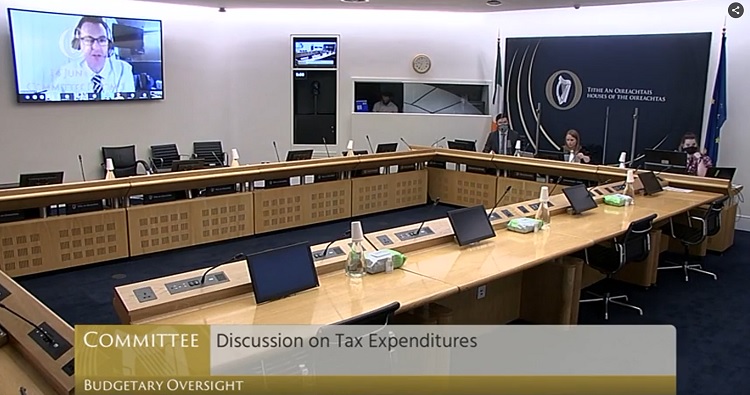Reform of 'discretionary' tax expenditures could soften financial costs of COVID, Oireachtas committee hears
Posted 14 July, 2021

The (opens in a new window)Oireachtas Committee on Budgetary Oversight has heard reform of the €15.8 billion Government spend on 'discretionary' tax expenditures could significantly lessen the financial costs of COVID-19.
(opens in a new window)Dr Micheál Collins, from UCD School of Social Policy, Social Work and Social Justice, outlined a number of measures he said were likely to generate significant additional State income that could help to limit any future cuts to social welfare or total tax increases.
Within the context of possibly broadening the tax base in Ireland post pandemic, he said reform of tax expenditure had “an important role to play”.
“Data from the Revenue Commissioners for 2018 show approximately 85 ‘discretionary’ tax expenditure measures costing a total of €15.8 billion in revenue forgone; these are measures which are not structural to the taxation system but rather have been put in place to incentivise certain activities or as a means of pursuing certain policy objective,” he said.
“Many of these are well targeted and worthwhile, although for the most part we assume this rather than have any hard evidence to support it, while others have a less robust basis for defending their cost and effectiveness.
“Put simply, for every €5 collected in taxation and social insurance, the state currently decides not to collect an additional €1 which is forgone through the provision of various tax breaks and reliefs.”
These 85 tax-relieving measures cover a range of allowances, reliefs and reductions for individuals and families.
The five reforms to tax expenditures discussed by Dr Collins were:
- Broadening the high-income individuals’ restriction to cover all tax relief measures.
- Phasing out tax credits for earners above €100,000 per annum.
- Reforming tax reliefs on pension savings, namely:
- Limiting all pension contributions to tax relief at a single rate of income taxation.
- Restricting the tax-free lump-sum payment to a value equivalent to two-thirds of average earnings.
- Reducing the standard fund threshold (SFT) to €1 million.
- Abolish the Special Assignee Relief Programme (SARP).
- Standard rating of other tax reliefs.
Among the reforms suggested was that the Government should consider limiting certain tax reliefs for pensions that disproportionality favour the savings of higher income earners.
This 'forgone' revenue could amount to as much as €2.7bn annually in savings for the State.
“Coupled with the impact of higher public debt, higher than anticipated debt financing costs, and the long-overdue reform of the international corporate taxation system, it seems inevitable that the state will have to raise more taxation on a recurring basis once the pandemic has subsided,” the Oireachtas Committee heard.
“In the absence of large-scale reductions in public services and redistributive supports, an increase in total taxation and social insurance contributions is a matter of how not if.”
Another area in need of reform Dr Collins said was the Special Assignee Relief Programme (SARP) for foreign executives.
This scheme cost €42.4 million in 2018, and provides for full income tax relief on 30% of income over the €75,000 tax threshold.
According to Dr Collins, its average recipient had an income of €313,000.
“This would put them in the top half per cent of the earnings distribution. While there are economic benefits to a schemes such as this, one could make similar arguments for many other jobs and roles,” he said.
“However, do earners at this level of income need a tax reduction? On the grounds of fairness, I think the scheme is hard to justify; there are better uses for these resources,” he added.
By: David Kearns, Digital Journalist / Media Officer, UCD University Relations






